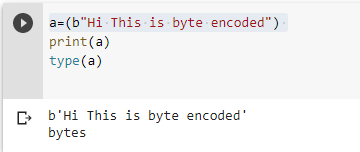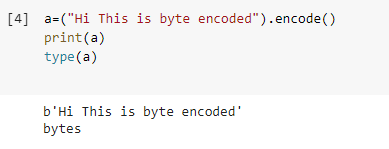Собственно, ошибка: TypeError:
a bytes-like object is required, not ‘str’
Ошибка в строке » sock.send(‘Hello, World») «
Ошибка нашлась в приложении клиента, вот собственно код клиента:
import socket
sock = socket.socket()
sock.connect(('localhost', 9090))
sock.send('hello, world!')
data = sock.recv(1024)
sock.close()
print(data)
Вот код сервера:
import socket
sock = socket.socket()
sock.bind(('', 9090))
sock.listen(1)
conn, addr = sock.accept()
print('connected:', addr)
while True:
data = conn.recv(1024)
if not data:
break
conn.send(data.upper())
conn.close()
Я этот пример вообще списал, т.к только-только (буквально пару минут назад) начал изучение сокетов, а тут такое.
You cannot access a bytes-like object like a string, for example, if you try to replace characters or perform a character-based search on a bytearray. If you perform an operation for a string on a bytes-like object, you will raise the error: TypeError: a bytes-like object is required, not ‘str’.
This tutorial will go through the error in detail and an example scenario to learn how to solve it.
Table of contents
- TypeError: a bytes-like object is required, not ‘str’
- What is a TypeError?
- What is a Bytes-like Object?
- Example
- Solution #1: Read mode
- Solution #2: Decode
- Summary
TypeError: a bytes-like object is required, not ‘str’
What is a TypeError?
TypeError tells us that we are trying to perform an illegal operation for a specific Python data type. The particular error message tells us we are treating a value like a string rather than like a bytes-like object. Byte-like objects are distinct from strings, and you cannot manipulate them like a string.
What is a Bytes-like Object?
Any object that stores a sequence of bytes qualifies as a bytes-like object. These objects include bytes, bytearray, array.array. Str is a Python text type. The characters are not in a specific encoding, so you cannot directly use them as raw binary data, and you have to encode them first. To create byte objects, we can use the bytes() function. Let’s look at an example of converting a string to a bytes object. We pass the string as the first argument, and the second is the encoding we want to use.
my_string = "researchdatapod.com"
print("The given string is: ", my_string)
bytes_obj = bytes(my_string, "UTF-8")
print("The bytes object is: ", bytes_obj)
print("The size of the bytes: ", len(bytes_obj)
The given string is: researchdatapod.com The bytes object is: b'researchdatapod.com' The size of the bytes: 19
Example
If you try to open a file as a binary file instead of a text file, you can encounter this error. Let’s look at an example where we try to read a text file storing the names of pizzas and print the pizzas that contain chicken in the name to the console.
First, let’s create our text file called pizzas.txt:
margherita pepperoni four cheeses ham and pineapple chicken and sweetcorn meat feast chicken fajita
Once we have the pizzas.txt, we can make a program that reads the file and prints the names with chicken in the name to the console:
with open("pizzas.txt", "rb") as f:
pizzas = f.readlines()
for pizza in pizzas:
if "chicken" in pizza:
print(pizza)
The above code opens up the file pizzas.txt and reads its contents to a variable called pizzas. The pizzas variable stores an iterable object consisting of each line in the pizzas.txt file. Next, we can use a for loop to iterate over each pizza in the list and check if each line contains “chicken”. If the line has the word “chicken”, the program prints the line to the console; otherwise, nothing happens. Let’s run the code to see what happens:
---------------------------------------------------------------------------
TypeError Traceback (most recent call last)
3
4 for pizza in pizzas:
5 if "chicken" in pizza:
6 print(pizza)
7
TypeError: a bytes-like object is required, not 'str'
We get this error because we a trying to access a bytes-like object as if it were a string. The source of the error is: with open(“pizzas.txt”, “rb”) as f:. The b in rb tells Python to open the pizzas.txt file as a binary. The Python interpreter treats binary files as a series of bytes, so if we check if “chicken” is in each line in the file, Python cannot check for a string in a bytes object, so the interpreter raises the error.
Solution #1: Read mode
We can solve this error by opening the file in read-mode instead of binary read mode. We do this by using “r” instead of “rb” in the with open… line. Let’s look at the revised code:
with open("pizzas.txt", "r") as f:
pizzas = f.readlines()
for pizza in pizzas:
if "chicken" in pizza:
print(pizza)
Let’s run the code to see what happens:
chicken and sweetcorn chicken fajita
The code runs successfully and prints the pizzas containing chicken in the name.
Solution #2: Decode
The decode() method is built-in to Python and converts an object from one encoding scheme to another. By default, the decode() method uses the “UTF-8” encoding scheme for conversion. Let’s look at the revised code with the decode() method:
with open("pizzas.txt", "rb") as f:
pizzas = [x.decode() for x in f.readlines()]
for pizza in pizzas:
if "chicken" in pizza:
print(pizza)
The above program opens the file as a binary and decodes every line from bytes to str. The program then iterates over each line and prints the lines that contain the word chicken. Let’s run the code to see what happens:
chicken and sweetcorn chicken fajita
The code runs successfully and prints the pizzas containing chicken in the name.
Summary
Congratulations on reading to the end of this tutorial! The error “TypeError: a bytes-like object is required, not ‘str’” occurs when you try to call a string as if it were a function. A common source of the error is trying to read a text file as a binary. To solve this error, you can either open the file in read-mode or use decode() to convert a bytes-like object to str type.
For further reading about strings, bytes string, and encodings, go to the article: What is the ‘u’ Before a String in Python?
Go to the online courses page on Python to learn more about coding in Python for data science and machine learning.
Have fun and happy researching!
Posted by Marta on March 22, 2023
Viewed 88601 times

In this article, I will explain why you will encounter the Typeerror a bytes-like object is required not ‘str’ error, and a few different ways to fix it.
The TypeError exception indicates that the operation you are trying to execute is not supported or not meant to be. You will usually get this error when you pass arguments of the wrong type. More details about the TypeError exception.

Apart from TypeError there are more exceptions in python. Check out this article to learn the most frequent exceptions and how to avoid them.
In this case, the bytes-like object is required message indicates the operation is excepting a bytes type; however, the type received was something else. Let’s see some examples.
Case #1: Reading from a file
This error comes up quite often when you are reading text from a file. Suppose that we have the following file, named file_sample.txt, containing the text below:
product;stock;price bike;10;50 laptop;3;1000 microphone;5;40 book;3;9
The file contains a list of products. Each line has the product name, the current stock available, and the price. I wrote a small program that will read the file and check if there are bikes available. Here is the code:
with open('file_sample.txt', 'rb') as f:
lines = [x.strip() for x in f.readlines()]
bike_available = False
for line in lines:
tmp = line.strip().lower()
split_line = tmp.split(';')
if split_line[0]=='bike' and int(split_line[1])>0:
bike_available = True
print("Bikes Available? "+ str(bike_available))
And the output will be :
Traceback (most recent call last):
Error line 7, in <module>
splitted_line = tmp.split(';')
TypeError: a bytes-like object is required, not 'str'
Explanation
When I opened the file, I used this: with open('file_sample.txt', 'rb') . rb is saying to open the file in reading binary mode. Binary mode means the data is read in the form of bytes objects. Therefore if we look at line 7, I try to split a byte object using a string. That’s why the operation results in TypeError. How can I fix this?
Solution #1: Convert to a bytes object
To fix the error, the types used by the split() operation should match. The simplest solution is converting the delimiter to a byte object. I achieve that just by prefixing the string with a b
with open('file_sample.txt', 'rb') as f:
lines = [x.strip() for x in f.readlines()]
bike_available = False
for line in lines:
tmp = line.strip().lower()
split_line = tmp.split(b';') # Added the b prefix
if split_line[0]==b'bike' and int(split_line[1])>0:
bike_available = True
print("Bikes Available? "+ str(bike_available))
Output:
Note I also added the b prefix, or bytes conversion, to the condition if split_line[0]==b'bike', so the types also match, and the comparison is correct.
Solution #2: Open file in text mode
Another possible solution is opening the file in text mode. I can achieve this just by removing the b from the open() action. See the following code:
with open('file_sample.txt', 'r') as f:
lines = [x.strip() for x in f.readlines()]
bike_available = False
for line in lines:
tmp = line.strip().lower()
split_line = tmp.split(';')
if split_line[0]=='bike' and int(split_line[1])>0:
bike_available = True
print("Bikes Available? "+ str(bike_available))
Output:
Typeerror: a bytes-like object is required, not ‘str’ replace
You could also find this error when you are trying to use the .replace() method, and the types are not matching. Here is an example:
text_in_binary = b'Sky is blue.Roses are red' #Bytes object
replaced_text = text_in_binary.replace('red','blue')
print(replaced_text)
Output:
Traceback (most recent call last):
File line 17, in <module>
replaced_text = text_in_binary.replace('red','blue')
TypeError: a bytes-like object is required, not 'str'
Solution #1
You can avoid this problem by making sure the types are matching. Therefore one possible solution is converting the string passed into the .replace() function( line 2), as follows:
text_in_binary = b'Sky is blue.Roses are red' replaced_text = text_in_binary.replace(b'red',b'blue') print(replaced_text)
Output:
b'Sky is blue.Roses are blue'
Note the result is a bytes object
Solution #2
Another way to get the types to match is converting the byte object to a string using the .decode() function( line 1), which will decode any binary content to string.
text= b'Sky is blue.Roses are red'.decode('utf-8')
print(type(text))
replaced_text = text.replace('red','blue')
print(replaced_text)
Output:
<class 'str'> Sky is blue.Roses are blue
Please note you could also save a string in the variable text. I am using decode() because this article aims to illustrate how to manipulate bytes objects.
Typeerror: a bytes-like object is required, not ‘str’ socket
You will encounter this error when you are trying to send a string via socket. The reason is the socket.send() function expect any data to be converted to bytes. Here is a code snippet that will throw the typeerror:
import socket
mysock = socket.socket(socket.AF_INET, socket.SOCK_STREAM)
mysock.connect(('www.py4inf.com', 80))
mysock.send('GET http://www.py4inf.com/code/romeo.txt HTTP/1.0nn')
while True:
data = mysock.recv(512)
if ( len(data) < 1 ) :
break
print (data);
mysock.close()
Output:
Traceback (most recent call last):
File line 4, in <module>
mysock.send('GET http://www.py4inf.com/code/romeo.txt HTTP/1.0nn')
TypeError: a bytes-like object is required, not 'str'
To fix this, you will need to convert the http request inside the string (line 4) to bytes. There are two ways you can do this. Prefixing the string with b, which will convert the string to bytes:
mysock.send(b'GET http://www.py4inf.com/code/romeo.txt HTTP/1.0nn')
or using .encode() method to convert the string to bytes:
mysock.send('GET http://www.py4inf.com/code/romeo.txt HTTP/1.0nn'.encode())
The output will be the same in both cases:
b'HTTP/1.1 404 Not FoundrnServer: nginxrnDate: Tue, 14 Jul 2020 10:03:11 GMTrnContent-Type: text/htmlrnContent-Length: 146rnConnection: closernrn<html>rn<head><title>404 Not Found</title></head>rn<body>rn<center><h1>404 Not Found</h1></center>rn<hr><center>nginx</center>rn</body>rn</html>rn'
The server response indicates the file we requested doesn’t exist. However, the code created the socket, and the HTTP request hit the destination server. Therefore we can consider the error fixed
Encode and decode in python
The primary reason for this mistake is providing an incorrect data type to a function. As a result, when a function requires a bytes object as input, it’s crucial to convert the argument before passing it. This can be achieved by adding the b prefix or by utilizing the .encode() function.
Bytes to String – Decode
string_var = b'Hello'.decode('utf-8')
print(type(string_var))
Output:
String to Bytes – Encode
bytes_var = 'Hello'.encode() print(type(bytes_var))
Output:
Conclusion
To summarise, when you encounter this error, it is important to double-checking the types you are used and make sure the types match, and you are not passing a wrong type to a function. I hope this helps and thanks for reading, and supporting this blog. Happy Coding!
Recommended Articles




Hello geeks and welcome, In this article, we will cover Type error: a byte-like object is required, not ‘str.’ Along with that, we will look at the root cause due to which this error occurs. Then we will look at different methods with the help of which we can get rid of this error. The root cause of this error lies in its name. Let us try to dissect it.
Type error: a byte-like object is required, not ‘str.’ What can we make of this statement? It clearly mentions that it requires a byte-like object, but instead, we are providing it with a string. Therefore the function can not be processed. In general, we can conclude that such error occurs when we try to pass a wrong argument to a function.
Now since we a have a basic understanding regarding this topic let us try to explore it in details in the coming sections.
We will see a basic example related to this error, and then we will try to rectify it. First, we need to create a python file to execute this program. For our example, we have created the file in this manner.
f = open("sample.txt", "w+")
for i in range(1):
f.write("USA,Californian")
f.write("USA,Texasn")
f.write("Spain,Madridn")
f.write("France,Parisn")
f.write("USA,Floridan")
f.close()
This is how we create a text file in python. After successfully executing it we will get an output of this type.
//Country//state
USA,California
USA,Texas
Spain,Madrid
France,Paris
USA,FloridaSince we are done with the file creation next, our goal is to get all the data from this text file with “USA.” Let us write our code and see what output we get
f = open("sample.txt", "w+")
for i in range(1):
f.write("USA,Californian")
f.write("USA,Texasn")
f.write("Spain,Madridn")
f.write("France,Parisn")
f.write("USA,Floridan")
f.close()
with open("sample.txt", "rb") as file:
f= file.readlines()
for r in f:
if "USA" in r:
print(r)

We get a Type error on running our code: a byte-like object is required not ‘str.’ What can be the principal reason behind it? The reason is that we have tried to open our text file as binary. We can rectify this error by opening our file in just read mode instead of binary mode. Let us try it out
f = open("sample.txt", "w+")
for i in range(1):
f.write("USA,Californian")
f.write("USA,Texasn")
f.write("Spain,Madridn")
f.write("France,Parisn")
f.write("USA,Floridan")
f.close()
with open("sample.txt", "r") as file:
f= file.readlines()
for r in f:
if "USA" in r:
print(r)

Output:
USA,California
USA,Texas
USA,FloridaHereby doing just a minute change, we can create a major difference and eliminate this error. Now let us look at another method by which we can get rid of this error.
f = open("sample.txt", "w+")
for i in range(1):
f.write("USA,Californian")
f.write("USA,Texasn")
f.write("Spain,Madridn")
f.write("France,Parisn")
f.write("USA,Floridan")
f.close()
with open(b"sample.txt", "r") as file:
f= file.readlines()
for r in f:
if "USA" in r:
print(r)
Instead of opening the file in text mode, we have converted the file into a bytes object. All that we did was add ‘b’ before our text file to achieve this. We made the necessary changes after the f.close() statement.
Here we covered different methods. You can use any of the 2 as per your convince, and liking both works fine. As well as help you write error-free code.
1. When using .replace()
The method .replace() is used to replace a particular phrase of a string with another phrase. Let us consider a sample code that helps us understand the thing better.
text=b"Sun sets in east"
new_text=text.replace("east","west")
print(new_text)
TypeError: a bytes-like object is required, not 'str'
In order to rectify this all that we need to do is add ‘b’ before east and west. Let us check whether it works or not.
text=b"Sun sets in east" new_text=text.replace(b"east",b"west") print(new_text)
See, it works. You can also take the approach to convert it into a text file. Do tell me comments about what you get.
2. Encode and decode
When dealing with encoding and decoding this in python, such error can also occur. Here Encoder is the person that constructs the message and sends it. At the same time, a decoder interprets it for themselves. So if you follow the particular order of Bytes-> String -> Bytes, such error will never occur.
The error Type Error: X first arg must be bytes or a tuple of bytes, not str is somewhat similar to what we discussed in this article. When we try to pass in a string method instead of bytes, it occurs. As discussed in this article, you can adopt a similar approach to get rid of it.
Conclusion
In this article, we covered Type error: a byte-like object is required, not ‘str.’ Along with we looked at the cause for this error. Also, we looked at different methods by which we can solve this. To this, we looked at a couple of different examples. We also looked at different instances where this method can occur.
I hope this article was able to clear all doubts. But in case you have any unsolved queries feel free to write them below in the comment section. Done reading this, why not read different ways to plot circle in Matplotlib next.
Typeerror a bytes like object is required not str error occurs when we compare any ‘str’ object with the ‘byte’ type object. The best way to fix this typeError is to convert them into ‘str’ before comparison or any other operation.
The clear reason is the compatibility of str objects with Byte type object. But let’s understand it with some coding examples.
a=("Hi This is byte encoded").encode()
b="Hi"
if b in a:
print("Sub String")Here We have encoded the string a and b is not encoded. Now when we use the “in” operator a is a byte type object. We get the same error.
Typeerror a bytes like object is required not str ( Solution) :
See ! this error is due to object compatibility. So let’s convert “str” object to byte. There are many ways to achieve it.
Solution 1. Encode “str” object to byte object-
In Continuation with the above example. Let’s encode the str object to Byte before the “in” operator.
a=("Hi This is byte encoded").encode()
b=("Hi").encode()
if b in a:
print("Sub String")Now run the above code.

Solution 2. Decode the Byte Object to ‘str’ :
Quite Simple. As earlier, we have converted str to byte. Here we are doing the opposite. Here we will decode the Byte to str.
a=("Hi This is byte encoded").encode()
b=("Hi")
if b in a.decode():
print("Sub String")Solution 3. Typecast Byte object to ‘str’ :
Firstly, Let’s see the code. Here we can typecast the Byte type object to str.
a=("Hi This is byte encoded").encode()
b=("Hi")
if b in str(a):
print("Sub String")Solution 4. Typecast Byte object to ‘str’ :
In a similar way above, We can also convert str objects into a Byte objects. Please refer to the below code.
a=("Hi This is byte encoded").encode()
b=bytes("Hi","utf-8")
if b in a:
print("Sub String")str to byte conversion Alternative –
If we want to convert a string ( str) object to a byte, we can do it easily by adding b”string” at the time of declaration. it is equivalent to encode() function.

Equivalent to :

Bytes like object is required not str ( Module specification ) –
Actually, the above error is generic and can replicate with multiple modules like subprocess, JSON, pickle, dict, etc. The fix would be the same in every platform and module if the root cause is the same for the similar Typeerrors. Well, I think this article is helpful in resolving the bug.
If you want more details on byte object to str or vice versa conversion. Please comment below.
Thanks
Data Science Learner Team
Join our list
Subscribe to our mailing list and get interesting stuff and updates to your email inbox.
We respect your privacy and take protecting it seriously
Thank you for signup. A Confirmation Email has been sent to your Email Address.
Something went wrong.

